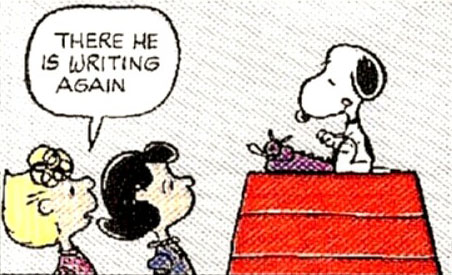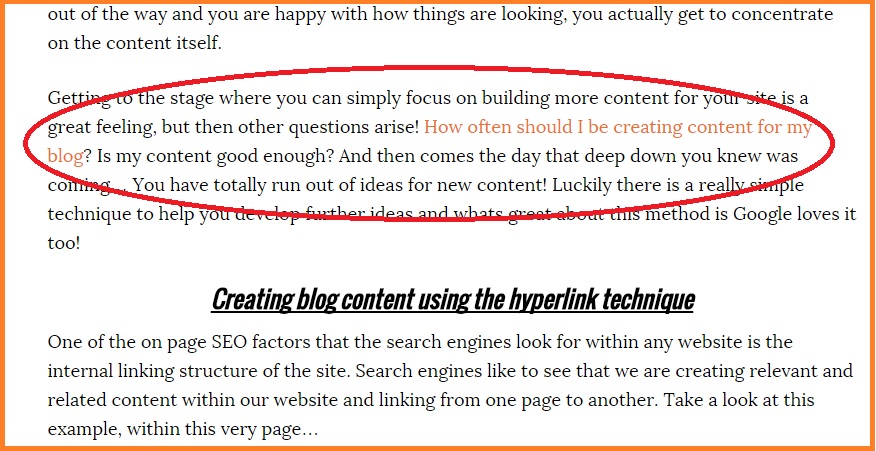
Today we are going to take a look at creating blog content within our site. It’s important to plan during the early stages of building a website. You should also have an idea of the subjects that it is going to cover.
Once you have an outline of what the site is going to contain, you should really ask yourself if you are able to talk about that subject confidently and for quite a long time? Also if there are other subject areas that you could branch off into in the future.
If you don’t already have a lot of knowledge about your chosen niche or subject matter, you must be prepared to do a lot of research. Gone are the days when websites with thin content are acceptable.
Table of Contents
Creating Blog Content For Humans And Search Engines
Today you are not only writing for human eyes, you are also writing for Google. If you expect to receive free organic traffic, you will need to please the search engines. Today we are going to take a look at some of the areas that you need to be aware of when building content pages and posts for your website.
If you have a good knowledge of your subject matter then you will find this method really easy. You will be surprised by how quickly you can expand your site.
Writing for humans and robots
When creating any kind of blog content it’s important to write your pages primarily for human eyes. What I mean by this is if you have gained even a basic knowledge of search engine optimization and using keywords within your text content, it can be really easy to lose focus of the fact that that you are actually speaking to someone and hopefully transferring valuable information to them via your website.
When Google takes a look at your website and decides where to rank you in the search engines, they are looking for the text and keywords that you have used. But they are also on the lookout for anyone who is attempting to manipulate the search results.
Focus On Keywords
Focusing your content on containing certain keywords is a good idea so long as this isn’t your primary objective. It’s far better when writing a page or a post to focus on just one main keyword. You can also focus on synonyms or related phrases throughout your content. If you are not sure how to optimize your posts and pages you should learn more about on-page SEO techniques.
Google knows when you are including keywords and phrases that are simply included for the sake of helping your rankings. So it’s far better to focus on including just one keyword per post that you want to rank for. When creating blog content the search engine optimization methods used within your pages should be invisible to the average reader. Your content should flow just like you are speaking with a friend.
The problems that we bloggers and website builders face!
The natural progression for any website or blog is to go through the beginning stages of development. The ideas phase, building the theme and the framework or the site, creating your first pages and posts. In the early days of building a website, things can be tricky especially when you have an image or an idea that you want to recreate on your site. But once you get that out of the way and you are happy with how things are looking, you actually get to concentrate on the content itself.
Getting to the stage where you can simply focus on creating blog content for your site is a great feeling. But then other questions arise! How often should I be creating content for my blog? Is my content good enough? And then comes the day that deep down you knew was coming… You have totally run out of ideas for new content! Luckily there is a really simple technique to help you develop further ideas. What’s great about this method is Google loves it too!
Creating blog content using the hyperlink technique
One of the on-page SEO factors that the search engines look for within any website is the internal linking structure of the site. Search engines like to see that we are creating relevant and related content within our website and linking from one page to another. Take a look at this example, within this very page…
The orange text shown here is a hyperlink, linking to an internal page that shows relevant content based on the text within the hyperlink.
The hyperlink in this example shows us linking from this very page that you are reading to another existing page. But what if you were to go back through your old posts? Would you find keywords, phrases or even product mentions that you have not yet created a post about?
Finding Inspiration In Old Posts
Whilst creating blog content we often talk about related subject matters that we never actually write a full post about. By going back and reading our old posts, it’s amazing what inspiration you can find!
This has a really good effect on your website. Because as you go back through your old content you can add new paragraphs. You can focus on linked content that talks about related content that you have already created and hyperlink them together. If the two pages are closely related you can add new content on both pages with links going back and forth.
This has the effect of making your older content fresh and more up to date. As well as increasing the chances of it being read more often by your readers. The more internal links you have going off to other relevant pages the easier it is for both your readers and Google to navigate.

This technique really works well when you find a phrase or topic within your old content that you have not yet written a post about. If you can create a whole new article from an idea that you got from one of your old posts then you can link the two together.
If you are really lucky you might find a post or page within your site that you can get several ideas from. In this case, you would also be able to branch off from that page and create several new posts. You will be surprised at how many possibilities you can find just by reading through your own content.
Final Thoughts
Going back over your material is a great way of creating new blog content. Linking those articles will create a better site design and will give your readers a better experience overall. This also has the benefit of giving the search engines exactly what they want, which will definitely benefit you.
Please post your comments & Questions!


Amazing! This is a really awesome piece of writing. I have got a much more clear idea on the topic of writing content from this post.
I’m pleased to help you Suhas! Feel free to drop by again and share your story with us once you start creating blog content.
Andrew, this article showed me a thing or two that I certainly didn’t know, like the hyperlinks from one page to another being beneficial to a site.
I’m still a newbie at this website building malarkey but I do really really enjoy it. It beats playing computer games, that’s for sure…
Back to on page SEO.
Not sure what this is really, do you have a link to a guide I can look at to help me with my SEO?
All the terms and abbreviations, html, css, and other stuff, there’s loads of it. But I am more knowledgeable now about what a hyperlink is for, thanks to you.
Will be back again soon,
Thanks for some very useful insights!
James
Hello James! Thanks for visiting my site. Yes I have a page that explains a little about search engine optimization and search engine marketing, check out what is SEO and SEM. You might also be interested to read my guide on SEO for 2016, learn how to seo your site in 2016 here. I will be posting a full A-Z guide on terms used within the SEO and marketing world soon. As you can imagine its quite a large task and that’s why I haven’t yet finished it. So stay tuned for that and I hope that these two links will help you further for now. Please contact me again if you have any more questions, I will be glad to help.
All the best!
Andrew
Hello Andrew,
you sure do have a way of communicating effectively. I was very intrigued with your messages and in fact probably read most of them but have no worries I will definately book mark your site and read more later.
Nice job Andrew.
Hi Kathleen! I know some of my posts can be quite long to read all in one sitting! Bookmark and return later. Let me know if you have any questions.
Regards,
Andrew
Well Done! We are all trying to master the art/science of first page ranking within Google. I am new to the business and found your article fascinating. Read it from top to bottom. Made some notes of things to do. I was especially intrigued with your reference to Quora. I am definitely going to check that out. I have filed your site in my reference library. Best of Luck
Hi there! Thank you for your comment, that’s very nice of you. I don’t think I have been part of a reference library before. Great to hear that you have gained something from this, its true we are all trying to get to that top spot in Google, but there are lots of them to aim for! Creating blog content is an ongoing mission for all of us. Some of our posts are going to be a great success, whilst others may not. The key is to focus on projecting your ideas onto your website and to keep your content fresh. At the end of the day both the search engines and your human visitors want to see the latest information within your niche, its your job to deliver that. When we fail to create good blog content then we start to lose readers and the search engines will lose interest too.
You mention Quora, this is something that I have been experimenting with a little. I may do a post in the future with some results from that.
Hope to hear from you again soon.
Hi Andrew,
You got a good point here by saying that your post should be written for human. Stuffing it with so many keywords will make it look unnatural and not-appealing to read.
Additionally, I love that you mention about how internal linking is essential in creating blog content. Not only it will help Google, but it will help the reader to navigate through your site and stay longer.
I also found that creating a series of articles about a particular topics really help to boost your article ranking. It’s similar with internal linking, just with more structure, say article no 1, article no 2, etc.
Hi Rina. That’s a really good point that you have made there. Something that we didn’t cover in this article is writing article series, we will no doubt come back to this subject in a later post! But yes, connecting articles or developing a series over a period of time will only encourage your readers to click through to other pages and return to your site later on to read more.
Hi Andrew
Great work indeed, you have outdone yourself on this post. I can relate to the above response to Stainer about coming up with new ideas and that point that you will start to see things coming together. The one thing I will take from this post is “linking relevant information back to your previous posts and doing some research on onpage SEO”.
Your post is genuine!
Hi Relly. Thank you so much for your kind words, it really does mean a lot to me! I’m pleased that you can take something from this article and work with it because it will make the world of difference to your site. As I said in the article, just by doing a little bit of extra work by linking to your older posts will increase your rate of having those posts seen. I’m looking forward to seeing how you progress with that. Also, don’t forget to go back over your old posts and link to newer posts, the more internal links pointing to relevant content the better. But please remember the key phrase here is “relevance”, don’t just add links for the sake of adding them.
With regards to “things coming together”, I’m glad that you picked up on that because its really true. There are so many people that give up before reaching the point where things do actually start coming together. Its a great point to get to in the creation of a website and it can be really difficult getting there at times, especially in the beginning. Get the basics done, get the outline of your site built with the main pages in place and then build up that content to a point where you can just post on a regular basis. Creating blog content then becomes a lot easier and a lot more enjoyable.
Thanks again for your comments, I wish you all the best!
Hello Andrew
Thank you for the article. Its very well written and clear and easy to follow, it makes alot of sense to me. Just your clearing of the website progression phases (coming up with ideas, developing them, then content..) helped to put things in perspective for me, that im still just starting out and i should be patient with the progression of my website. Great advice!! Thanks again
Hi Stainer. The thing to bare in mind here is, all sites are different. Build your site up to a level were you are happy that you have a few of your main subject areas covered and then simply take a step back and try to see your site as a member of the public would see it. Go back over all your content linking pages and posts and coming up with new ideas and at that point you will start to see things coming together. It takes a while and a bit of work to get there but with a little dedication you can do it. I would be interested to see your site and how it develops. Keep in touch!